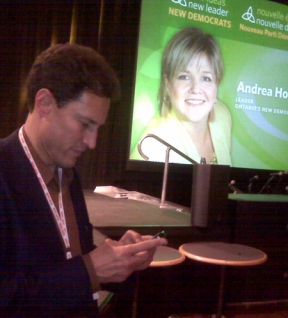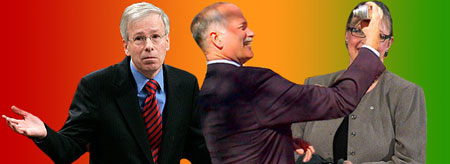Despite all of the standard disclaimers about why it’s a bad idea to pay attention to polls, it’s still notable that this Strategic Council poll (which has not traditionally had the Greens as high as some other polling companies) has the federal Green Party ahead of the NDP for the first time, with 13% to their 12%. Among other things, this is yet another argument that we need to be included in the next televised leaders’ debate. There’s also an argument to be made that this puts us in seat territory, since, as Jim Harris points out, the NDP elected 9 MPs in 1993 with only 6.88% of the vote.
One NDP blogger reacted to this news in the following way:
And I guess the near dead heat of the NDP and Greens shouldn’t go unacknowledged on an NDPers blog. To that I offer this, I greatly doubt the Green’s could sustain these numbers in a national election. However, it behooves the NDP to start giving some attention to a party that seems content on allowing the mis-conception that they are somehow equivalent to the NDP on the political spectrum.
To the first point, it’s true that in the past we’ve had difficultly pulling our vote out in numbers that some pollsters have predicted. That’s less true today, however, for two reasons. One, our party is better organized than it has ever been, with competent riding associations and experienced campaign managers establishing themselves in increasing numbers every day. That helps with the problem we’ve had of not “getting out the vote,” something the NDP excel at. Two, we’ve now passed a threshold of support where people consider us a serious party capable of electing MPs, as opposed to just a protest vote. That helps with the problem we’ve had of people entering the polling booth intending to vote green, but changing their mind at the last second for “strategic” reasons. If you don’t believe me, witness the results of the Ontario provincial election. Right up until polls closed bloggers and pollsters were predicting the provincial Greens would only pull 4%, maybe 6%. When the ballots were counted, however, we’d topped 8%, achieving the high numbers we’d been polling at.
To the second point, hopefully the author will be happy to learn that I am not content to allow any misconception that we “are somehow equivalent to the NDP on the political spectrum” to exist because, of course, we’re not. If we were, there’d be no point.
In fact, if people in general were under the impression that we were equivalent to the NDP, then it seems to me they’d be more likely to support the NDP for the oft repeated reason that “they have a better chance of winning.” (Note to any NDPers thinking of making this argument at my doorstep: if I wanted to blindly vote for the party with a good chance of winning, I’d vote Liberal.) No, quite the opposite is true: our support is as high as it is because people recognize that we are different from the NDP in many of the ways that we’re different from all of the status quo parties. (In short, and without trying to start a debate, we move beyond the old left/right spectrum and approach problems from a pragmatic, holistic perspective, while remaining the only party to acknowledge that there are limits to growth.)
Does that mean I’m cheering for the NDP’s demise, secretly hoping to wipe them off the map completely? Absolutely not. The NDP have a legitimate and important role to play in Canadian politics; I just can’t understand why they’re not playing it. If I were to offer some unsolicited advice, it would be as follows. Be true to yourselves. Stand up for traditionally “left wing,” socialist principals. Put away the focus groups and the talking points, the negative tone and the overly partisan rhetoric. Let Layton be Layton: think back to his excellent work as a city councilor in Toronto, when he was committed to getting things done instead of “getting things done,” if you get my meaning. That, in my opinion, is a recipe to get your supporters excited and believing in your party again.
Whatever you do, stop trying to become the new Liberal party. Please. We’ve got one of those already, we don’t need another one.

